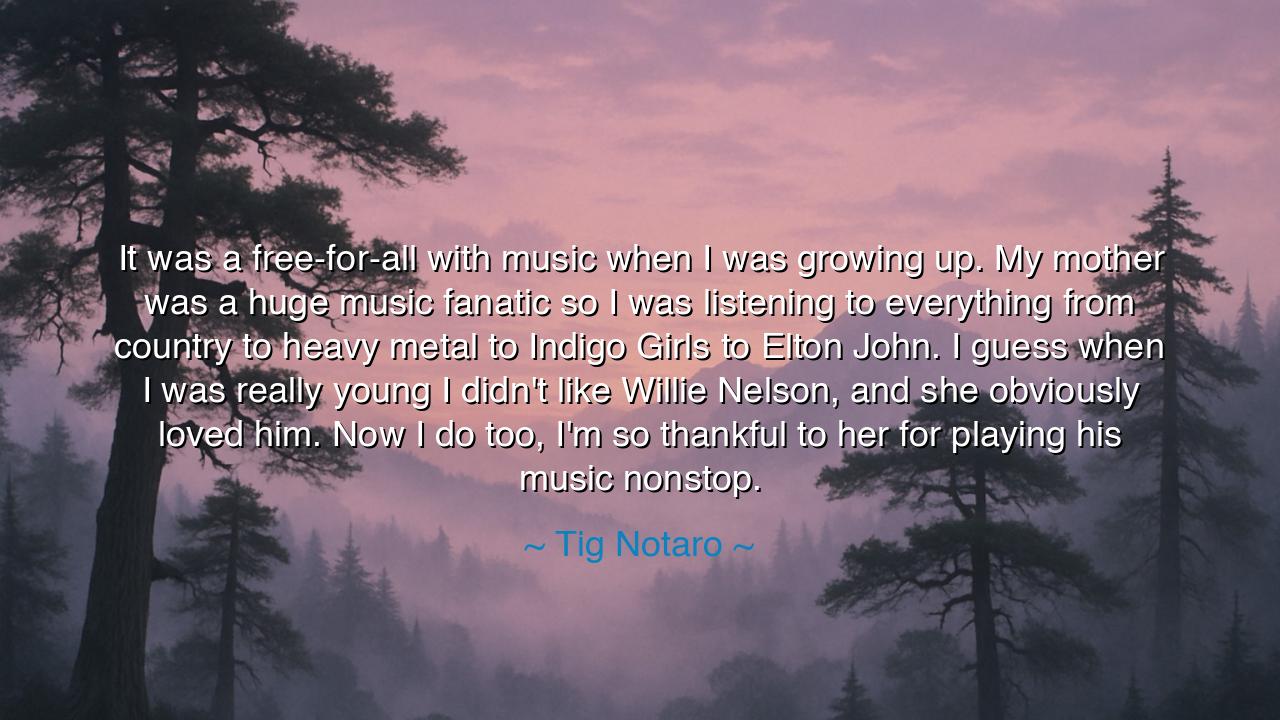
It was a free-for-all with music when I was growing up. My
It was a free-for-all with music when I was growing up. My mother was a huge music fanatic so I was listening to everything from country to heavy metal to Indigo Girls to Elton John. I guess when I was really young I didn't like Willie Nelson, and she obviously loved him. Now I do too, I'm so thankful to her for playing his music nonstop.






Tig Notaro recalls with warmth and wonder: “It was a free-for-all with music when I was growing up. My mother was a huge music fanatic so I was listening to everything from country to heavy metal to Indigo Girls to Elton John. I guess when I was really young I didn’t like Willie Nelson, and she obviously loved him. Now I do too, I’m so thankful to her for playing his music nonstop.” In this remembrance, we see the sacred power of music and the guiding influence of family, especially the mother who plants seeds in the soil of the child’s soul, long before the child knows what blossoms will grow.
In her words, Notaro paints the picture of a free-for-all, not as chaos but as abundance. Her childhood was a banquet of sound, where each dish was a different genre, each melody a different flavor of life. The ear of the young child is not yet trained to love all things, and so at first, she rejected what her mother adored. Yet, as she grew, she discovered the beauty her mother had always heard. This is the nature of gratitude: it often comes not in the moment of planting but later, when the harvest arrives, and we finally understand the wisdom of those who guided us.
The ancients knew that music was not mere entertainment but the very shaping of the soul. Plato declared that rhythm and harmony find their way into the secret places of the heart, molding the character of those who listen. Tig’s mother, by surrounding her with the songs of many voices—country, heavy metal, folk, and pop—was shaping a spirit that could appreciate diversity, resilience, and beauty. Though the child resisted some sounds, the persistence of exposure worked like water upon stone, leaving impressions that would later bloom into deep affection.
History offers many echoes of this truth. Consider Ludwig van Beethoven, who as a boy was forced by his father to practice for hours, often under harsh conditions. At the time, young Beethoven must have felt resentment, even rebellion. Yet those endless hours formed the foundation of the music that would one day thunder across the world. What once seemed a burden became the instrument of greatness. So too in Notaro’s story: what was once irritation at hearing Willie Nelson again and again transformed into admiration, respect, and love.
At its heart, Notaro’s reflection is about the hidden gifts of parents—those quiet, persistent offerings we do not understand until much later. A mother’s insistence may seem excessive to a child’s ears, but time reveals it as love. It is through her mother’s passion that Tig inherited not only a love of music but also a sense of gratitude for the persistence that carried it into her life. For the greatest gifts are not always chosen by us; they are given, and only later do we realize their value.
The lesson is clear: do not dismiss too quickly the passions of those who nurture you, for what seems excessive or unimportant may one day become a source of joy. Be patient with the things you resist, for time may turn them into treasures. Above all, be thankful to those who filled your world with gifts, even when you were too young, stubborn, or blind to see their worth.
Practically, this means we must revisit the things we once rejected, to see them again with wiser eyes. Re-read the books your elders loved, re-listen to the songs they cherished, revisit the traditions they preserved. In doing so, you may discover hidden jewels waiting to be claimed. And in turn, fill the lives of those you guide—children, friends, students—with gifts of beauty and truth, even if they resist, for the day will come when they, too, awaken to their value.
Thus, let Tig Notaro’s memory stand as a teaching for generations: that the music of childhood, woven by the hands of those who love us, is not wasted, even when resisted. It lingers, it shapes, it awakens. And in time, it blossoms into gratitude—a gratitude that turns the noise of yesterday into the harmony of today.






AAdministratorAdministrator
Welcome, honored guests. Please leave a comment, we will respond soon